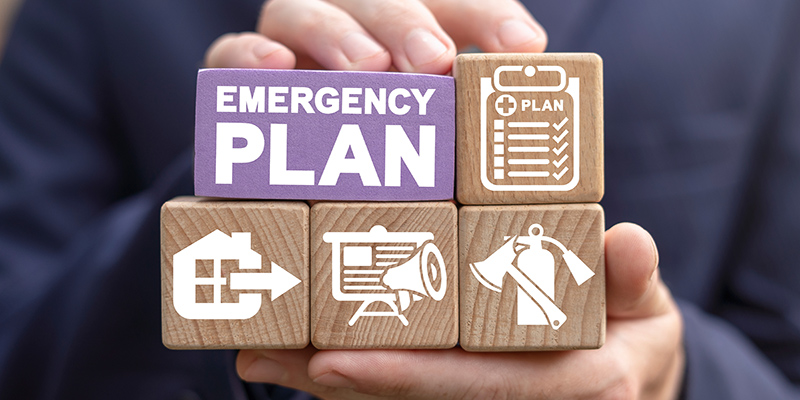Emergencies can happen at any time. Emergencies can take many forms in a planned community, but the homeowners association should always be prepared. Here is the proper HOA response to an emergency.
What Should Be the HOA Response to an Emergency?
Emergencies come in many different forms. Therefore, no single blueprint can universally apply to all types of emergencies. When determining the right response, an HOA should look at two things: the needs of the community and the type of emergency.
Some examples of emergencies include:
- Hurricanes
- Snowstorms
- Earthquakes
- Wildfires
- Tornadoes
- Floods
- Droughts
- Pandemics
- Terrorist attacks
- Military threats
The needs of the community, on the other hand, will depend on the following factors:
- Location. An HOA may experience a particular type of emergency more often than others depending on where they are. For example, the South and Southeast regions tend to face more tornadoes, landslides, and hurricanes. On the other hand, the West Pacific region gets more wildfires, and the East Coast gets more winter storms.
- Type. Communities with high-rise buildings will need more comprehensive evacuation plans because of their nature in comparison to single-family communities.
- Demographics. A community’s demographics can also influence the HOA response to an emergency. If an HOA has mostly seniors, then communication and evacuation plans must be tailored to them.
- Features. Other features that can impact the needs of a community’s emergency preparedness include common areas, amenities, landscaping, buildings, and equipment.
Whatever the case, one of the most important HOA obligations in emergencies is to ensure the health and safety of residents and guests as well as to minimize property damage. When coming up with a plan, make sure to consider the community’s characteristics and the emergency type.
Before an Emergency
 It is best to come up with an emergency plan that caters to every type of emergency. This plan should include details on what the association should do before, during, and after the emergency strikes. It should consist of all precautionary measures that the HOA must take.
It is best to come up with an emergency plan that caters to every type of emergency. This plan should include details on what the association should do before, during, and after the emergency strikes. It should consist of all precautionary measures that the HOA must take.
For instance, in the event of a health crisis, it is best to close all amenities and facilities to mitigate the spread of the infection. It is also worth moving meetings to a virtual setting. These are things that many associations had to learn the hard way during the COVID-19 pandemic.
When it comes to natural disasters such as hurricanes and snowstorms, HOAs should make proper preparations. This is part of HOA board duties in an emergency. All common areas should be prepared for inclement weather conditions. That means boarding windows and doors, securing outdoor fixtures, and general weatherproofing. Performing preventive maintenance can minimize the property damage brought on by strong winds and heavy rain.
During the Emergency
Although associations are not government entities in any way, they can look to government agencies for guidance. During times of disaster, government agencies will usually issue directives or recommendations. Homeowners associations can act as a support of sorts in helping facilitate these directives or even just spreading information about them. Many associations also have volunteer groups that assist with emergency response.
Once disaster comes, an HOA should take the necessary steps to prevent or remedy hazardous conditions in common areas. Of course, this does not require board members to charge outside amid harsh weather conditions. These actions should only take place once it is safe, though sooner is better.
Performing preventive and corrective maintenance during an emergency can significantly reduce damage and safety hazards. This means cutting off access to areas that present safety hazards, coordinating with technicians to make emergency repairs, and removing any debris in common areas that can inflict injury or property damage.
After the Emergency: HOA Finances in Emergencies
Following a disaster, HOAs will need to evaluate the extent of property damage (if any) and assess the need for repairs. It is best to establish relationships with vendors and contractors ahead of time, perhaps even having them on retainer. This is because vendors and contractors will probably be in high demand in times of emergencies. Make sure to hire the right professionals for specific types of jobs.
One of the most critical aspects of proper HOA response to an emergency is financial management. An association will need to source funds for repairs from somewhere. Keep in mind that homeowners will likely face financial hardships as well during times of emergency. As such, HOAs should be open to offering payment plans or temporarily delaying regular dues.
Homeowners, on the other hand, should make every effort to stay up-to-date on their payments, as it will benefit the community as a whole. Even if community amenities are closed, owners must still pay their fees, as these fees don’t solely go toward amenity maintenance.
When an HOA’s operating budget can’t cover the cost of emergency repairs, it usually has three options:
- Reserve Fund. While reserve funds are used to pay for the cost of future repairs and replacements, they also function as emergency funds. With a well-funded reserve account, the HOA has enough money to respond to emergencies.
- Special Assessment. If regular dues or reserves are insufficient, the HOA can charge a one-time special assessment.
- Loan. If the governing documents permit, an HOA can take out a loan to cover the cost of emergency repairs. Typically, the HOA will need to use association property as collateral for a loan and can secure one with a low interest rate. Some HOAs, though, do require a vote from the membership to get a loan.
The Role of Insurance During Emergencies
 To minimize the financial burden on the homeowners, it is wise for every HOA to purchase a comprehensive insurance policy with coverage for emergencies or disasters. Generally, an HOA master policy with liability protection and common area property damage coverage is sufficient. However, it is a good idea to purchase additional coverage for disasters or emergencies (if not already included in the master policy).
To minimize the financial burden on the homeowners, it is wise for every HOA to purchase a comprehensive insurance policy with coverage for emergencies or disasters. Generally, an HOA master policy with liability protection and common area property damage coverage is sufficient. However, it is a good idea to purchase additional coverage for disasters or emergencies (if not already included in the master policy).
While insurance is important to every association, it is especially so for condominiums. Unit owners may have their own insurance covering their individual dwellings, but the shared areas don’t typically fall under such policies. As such, condominiums should have a policy that covers both common areas as well as limited common areas.
Associations should make it clear to homeowners that the HOA’s master policy does not cover their individual homes. They will need to secure their own homeowners insurance, which is sometimes required by associations.
After an emergency, the HOA board should file a claim with their provider and submit all supporting documents necessary. The response from the insurance company, especially during disasters, may take a while. In the meantime, if repairs are immediately needed, the HOA can take out a loan, dip into the reserves, or charge a special assessment. Once the claim is adjusted and paid out, the HOA can then use the payout to settle the loan or replace the reserves used.
All things considered, insurance is essential to any homeowners association. During emergencies, insurance provides a financial safety net, preventing HOAs from having to pay for costly repairs out of pocket.
Do HOA Boards Have Emergency Powers?
While homeowners associations share many similar qualities with government bodies, they are not governmental at all. HOAs don’t have sovereign authority, so emergency powers don’t really apply to most associations. An HOA board also can’t give itself emergency powers without some source of authority backing it up. In this case, this source of authority takes the form of either state laws or governing documents.
An example of a state that grants emergency powers to HOAs would be Florida. Florida Statutes Section 720.316 and 718.1265 respectively give HOAs and condominiums expanded power when a state of emergency is declared. The power of an association is only expanded to the point necessary to promote safety and reduce further damage. Notably, state nonprofit acts can also apply to HOAs in times of emergency.
Keep in mind that HOA boards should still use any emergency powers in accordance with their fiduciary duties. Just because a board receives expanded powers doesn’t mean it can use them for its own benefit. Any board that goes against its fiduciary duties, whether in times of emergency or otherwise, will likely have to face legal trouble.
Boards should also be careful not to step out of their bounds. An HOA that goes too far with its expanded powers may experience some pushback from homeowners. Boards that overdo it can be viewed as abusing their power. This will not only sow discord within the community and prevent a proper HOA response to an emergency, but it will also put the board at risk of legal liability.
The Bottom Line
It can be difficult to figure out the proper HOA response to an emergency. Many HOA boards panic once disaster strikes, but panic will not get you anywhere. The most responsible thing to do is to prepare for emergencies ahead of time. Boards should carefully write out a plan to follow before, during, and after an emergency.
In times of crisis, having an HOA management company like Clark Simson Miller by your side can come in handy. Call us today at 865.315.7505 or contact us online to learn more about our services.
RELATED ARTICLES:
- Can HOAs Ask For Special Assessments?
- HOA Reserve Funds 101: What Does Your HOA Do With It?
- How Can The HOA Board Adjust Its Role During The COVID-19 Pandemic?

